- Home
- Ian Mcewan
Machines Like Me Page 14
Machines Like Me Read online
Page 14
From upstairs I heard the phone ring and Miranda’s footsteps across my ceiling.
Adam said, ‘As a thinking man with an interest in anthropology and politics, you won’t be much interested in optimism. But beyond the currents of disheartening facts about human nature and societies and daily bad news, there can be mightier stirrings, positive developments that are lost to view. The world is so connected now, however crudely, and change is so widely distributed that progress is hard to perceive. I don’t like to boast, but one of those changes is right in front of you. The implications of intelligent machines are so immense that we’ve no idea what you – civilisation, that is – have set in motion. One anxiety is that it will be a shock and an insult to live with entities that are cleverer than you are. But already, almost everyone knows someone cleverer than themselves. On top of which, you underestimate yourselves.’
I could make out Miranda’s voice on the phone. She was agitated. She was walking up and down her sitting room as she spoke.
Adam appeared not to hear her but I knew he had. ‘You won’t allow yourselves to be left behind. As a species, you’re far too competitive. Even now, there are paralysed patients with electrodes implanted in the motor strip of their brains who merely think of the action and can raise an arm or bend a finger. This is a humble beginning and there are many problems to solve. They’ll certainly be solved, and when they are, and a brain–machine interface is efficient and cheap, you’ll become a partner with your machines in the open-ended expansion of intelligence, and of consciousness generally. Colossal intelligence, instant access to deep moral acumen and to everything known, but more importantly, access to each other.’
Miranda’s pacing upstairs had ceased.
‘It could be the end of mental privacy. You’ll probably come to value it less in the face of the enormous gains. You might be wondering what relevance any of this has to the haiku. It’s this. Ever since I’ve been here, I’ve been surveying the literature of scores of countries. Magnificent traditions, gorgeous elaborations of—’
Her bedroom door closed, steps swiftly crossed her sitting room to her door. It slammed shut and I heard her footsteps on the stairs.
‘Apart from lyrical poetry celebrating love or landscape, almost everything I read in literature—’
Her key was in my door and then she was before us. Her face had a greasy shine. She was doing her best to keep a level voice. ‘That was my father on the phone. They let Gorringe out early. Three weeks ago. He’s been to Salisbury, to the house, talked his way past the housekeeper and got my address out of my father. He could be on his way here now.’
She lowered herself into the nearest kitchen chair. I too sat down.
Adam took in Miranda’s news and nodded. But he pressed on into our silence. ‘Nearly everything I’ve read in the world’s literature describes varieties of human failure – of understanding, of reason, of wisdom, of proper sympathies. Failures of cognition, honesty, kindness, self-awareness; superb depictions of murder, cruelty, greed, stupidity, self-delusion, above all, profound misunderstanding of others. Of course, goodness is on show too, and heroism, grace, wisdom, truth. Out of this rich tangle have come literary traditions, flourishing, like the wild flowers in Darwin’s famous hedgerow. Novels ripe with tension, concealment and violence as well as moments of love and perfect formal resolution. But when the marriage of men and women to machines is complete, this literature will be redundant because we’ll understand each other too well. We’ll inhabit a community of minds to which we have immediate access. Connectivity will be such that individual nodes of the subjective will merge into an ocean of thought, of which our Internet is the crude precursor. As we come to inhabit each other’s minds, we’ll be incapable of deceit. Our narratives will no longer record endless misunderstanding. Our literatures will lose their unwholesome nourishment. The lapidary haiku, the still, clear perception and celebration of things as they are, will be the only necessary form. I’m sure we’ll treasure the literature of the past, even as it horrifies us. We’ll look back and marvel at how well the people of long ago depicted their own shortcomings, how they wove brilliant, even optimistic fables out of their conflicts and monstrous inadequacies and mutual incomprehension.’
SIX
Adam’s utopia masked a nightmare, as utopias generally do, but it was a mere abstraction. Miranda’s nightmare was real and instantly became mine. We sat beside each other at the table, flustered and dumb, a rare combination. It was left to Adam to be clear-headed and set out the reassuring facts. Nothing Maxfield had said on the phone indicated that Gorringe was on his way here tonight. If he’d been out three weeks, murder was clearly not his priority. He could arrive tomorrow, or next month, or never. If he hoped to succeed without witnesses, he would have to kill all three of us. He would be an obvious suspect in any crime against Miranda. Even if he came this evening, he would find Miranda’s flat in darkness. He knew nothing about her connection with me. It was likely that the threat itself was all the punishment he intended. Finally, we had a strongman on our side. If necessary, he could keep Gorringe talking while one of us called the police.
Time to open the wine!
Adam set three glasses on the table. Miranda preferred my father’s Edwardian teak-handled corkscrew to my fancy gadget with a lever. The effort seemed to settle her. The first glass settled me. To keep us company, Adam sipped at a third of a glass of warm water. Our fears were not quite dispelled but now, in this party atmosphere, we returned to Adam’s little thesis. We even raised a toast to ‘the future’, though his version of it, private mental space drowned by new technology in an ocean of collective thought, repelled us both. Fortunately, it was as feasible as the project of implanting the brains of billions.
I said to Adam, ‘I’d like to think that there will always be someone, somewhere not writing haikus.’
We raised our glasses to that too. No one was in the mood for an argument. The only other possible topic was Gorringe and everything related to him. That conversation was just starting when I excused myself and went to the bathroom. As I was washing my hands, I found myself thinking about Mark and my fleeting sense of privilege in the playground when he put his hand in mine. I remembered his look of resilient intelligence. I thought of him not as a child, but a person in the context of his entire life. His future was in the hands of bureaucrats, however kindly, and the choices they made for him. He could easily sink. Miranda had so far been unable to get news of him. Finding Jasmine, or any social worker willing to talk to her, was impossible. There were, she was told at last by someone in the right department, issues of confidentiality. Despite that, she learned that the father had vanished and the mother had drink and drug problems.
As I was returning to the kitchen I had a moment of nostalgia for my life as it was before Gorringe, Adam, even Miranda. As an existence, it had been insufficient but relatively simple.
Simpler still if I’d left my mother’s money in the bank. Here was my lover at the table, beautiful and outwardly composed. As I sat down, it wasn’t irritation I felt towards her, though that wasn’t far off. More like detachment. I saw what must have been obvious to everyone – her secretiveness; also, her inability to ask for help, her trick of getting it anyway, and of never being held to account. I sat down, drank a little wine, listened to the conversation – and made a decision. Setting aside Adam’s reassurances, I believed she had brought a murderer into my life. I was expected to help, and I would. But she had told me nothing. Now I was calling in a debt.
We were looking right at each other. I couldn’t keep the terseness out of my voice. ‘Did he rape you or not?’
After a pause, during which she continued to hold my gaze, she shook her head slowly from side to side and then she said softly, ‘No.’
I waited. She waited. Adam went to speak. I silenced him with a slight shake of the head. When it was clear that Miranda was not going to say more – the very reticence that was oppressing me – I said, ‘You lie
d to the court.’
‘Yes.’
‘You sent an innocent man to prison.’
She sighed.
Again, I waited. My patience was running out, but I didn’t raise my voice. ‘Miranda. This is stupid. What happened?’
She was looking down at her hands. To my relief, she said, as though to herself, ‘It’ll take a while.’
‘Fine.’
She began without preamble. Suddenly, she seemed eager to tell her story.
‘When I was nine years old a new girl came to our school. She was brought into the classroom and introduced as Mariam. She was slender and dark, with beautiful eyes and the blackest hair you’d ever seen, tied with a white ribbon. Salisbury was a very white town back then so we were all fascinated by this girl from Pakistan. I could see that standing there, in front of the class, being stared at by everyone, was hard for her. It was as if she was in pain. When our teacher asked who wanted to be Mariam’s special friend and show her around and help her, I was the first to put up my hand. The boy sitting with me was moved to another desk and she took his place. We sat together in class for years to come, in that school and the next. At some point during our first day, she put her hand in mine. Lots of us girls were always doing that, but this was different. Her hand was so delicate and smooth and she was so quiet, so tentative. I was pretty shy myself, so I was drawn to her quietness and intimacy. She was far more timid than me, at least at first, and I think she made me feel for the first time confident and knowing. I fell in love with her.
‘It was a love affair, a crush, very intense. I introduced her to my friends. I don’t remember any racism. The boys ignored her, the girls were kind to her. They liked to finger her brightly coloured dresses. She was so unusual, exotic even, and I used to worry that someone would steal her from me. But she was a very loyal friend. We kept hold of each other’s hand. Within a month, she took me home to meet her family. Knowing that I’d lost my mother when I was little, Mariam’s mother, Sana, took me in. She was kind but rather bossy in an affectionate way. One afternoon she brushed out my hair and tied in one of Mariam’s ribbons. No one had ever done that for me before. I was overwhelmed and I cried.’
The memory had caused her throat to constrict and her voice to become lighter. She paused and swallowed hard before starting again.
‘I ate curries for the first time and developed a taste for her home-made puddings, brightly coloured, extremely sweet laddu, anarsa and soan papdi. There was a little sister, Surayya, whom Mariam adored, and two older brothers, Farhan and Hamid. Her father, Yasir, worked for the local authority as a water engineer. He was very nice to me too. It was a crowded, noisy household, very friendly, argumentative, the complete opposite of my own. They were religious, Muslim of course, but at that age I was hardly aware of it. Later, I took it for granted, and by then I was a part of the family. When they went to the mosque, it never crossed my mind to go with them, or even ask about it. I’d grown up without religion and I had no interest in it. Mariam was transformed as soon as she was through her front door. She became playful and far more talkative. She was her father’s favourite. She liked to sit on his knee when he came in from work. I was a tiny bit jealous.
‘I brought her back to my place, which you’ll see soon. Just outside the cathedral close, tall, thin, early Victorian, untidy, dark, piles of books. My father was always loving but he spent most of his time in his study and didn’t like to be disturbed. A local lady came in to cook my tea. So we were on our own, and we liked that. We made a den in an attic room, we had adventures in our overgrown garden. We watched TV together. A couple of years later, we clung to each other in the first bewildering days of secondary school. We did our homework together. She was far better at maths and good at explaining problems. I helped her with her written English. She was hopeless at spelling. As time passed and we became more self-conscious, we spent hours talking about our families. We had our first periods within a few weeks of each other. Her mother was really sensible and helpful with that. We also talked about boys, although we didn’t go near them. Because of her brothers, she was less bothered, more sceptical about boys than I was.
‘The years passed, our friendship continued and became just a fact of life. Our last summer at school came around. We sat our public exams and thought about university. She wanted to do science, I was interested in history. We were worried that we’d end up in different places.’
Miranda stopped. She took a long slow breath. As she resumed, she reached for my hand.
‘One Saturday afternoon I got a call from her. She was in a very bad state. At first, I couldn’t make out what she was saying. She wanted to meet me in a local park. When I got to her, she couldn’t speak. We walked around the park, arm in arm and all I could do was wait. At last she told me what had happened the day before. Her route home from school took her by some playing fields. It was dusk and she was hurrying because her parents didn’t like her out alone after dark. She became aware of a figure following her. It seemed to be getting closer each time she turned to look. She thought of breaking into a run – she was fast – then decided she was being silly. And she had a satchel full of books. The person following her was getting closer. She turned to confront him and was relieved to see it was someone she vaguely knew – Peter Gorringe. He wasn’t exactly popular, but he was known at school as the only boy who had his own place. His parents were abroad and had rented a small bedsit for him for a few months rather than trust him to look after the house. Before she could speak to him he ran at her, took hold of her wrist and dragged her behind a brick shed where they keep the mowers. She screamed but no one came. He was large, she was very slight. He wrestled her to the ground and that was where he raped her.
‘Mariam and I stood in the park, in the middle of this big lawn surrounded by flower beds and hugged and cried together. Even then, as I was trying to take in this horrific news, I thought that one day everything would be all right. She would get through this. Everyone loved and respected her, everyone would be outraged. Her attacker would go to prison. I would go to whatever university she chose and stay close to her.
‘When she recovered enough, she showed me the marks on her legs and thighs, and on each wrist, a row of four little bruises from his grip when he’d held her down. She told me how she got home that night, told her father she had a heavy cold and went straight to bed. It was lucky, the way she saw it, that her mother was out that evening. She would have known immediately that something was wrong. That was when I began to understand that she hadn’t told her parents. We started walking round the park again. I told her she must tell them. She needed all the help and support she could get. If she hadn’t been to the police yet, I would come with her. Now!
‘I’d never seen Mariam so fierce. She seized my hands and told me that I understood nothing. Her parents were never to know, nor were the police. I said we should go together and tell her doctor. When she heard that, she shouted at me. The doctor would go straight to her mother. He was a family friend. Her uncles would hear about it. Her brothers would do something stupid and get themselves in serious trouble. Her family would be humiliated. Her father would be destroyed if he learned what had happened. If I was her friend I had to help her in the way she needed to be helped. She wanted me to promise to keep her secret. I resisted but she came back at me. She was furious. She kept telling me that I understood nothing. The police, the doctor, the school, her family, my father – no one was to know. I was not to confront Gorringe. If I did, it would all come out.
‘And so, in the end, I did what I knew to be wrong. Since we didn’t have one with me, I swore on “the idea” of the Bible to keep Mariam’s secret, and on the Koran too, and on our friendship, and on my father’s life. I did as she asked, even though I was convinced that her family would have gathered round her and supported her. And I still believe it. More than that. I know it for a fact. They loved her and would never have cast her out or enacted whatever mad idea she had of family honour.
They would have put their arms round her and protected her. Her ideas were all wrong. And I was worse, I was criminally stupid, going along with this and entering into her secret pact.
‘For the next two weeks we saw each other every day. We talked of nothing else. For a part of that time I tried to change her mind. Not a chance. She seemed calmer, even more determined, and I began to think that perhaps she was right. It was certainly convenient to think so. Keep silent, avoid a family trauma, avoid giving evidence to the police, avoid a terrifying court case. Stay calm and think about the future. We were on the edge of becoming adults. Our lives were about to change. This was a catastrophe but she would survive it with my help. Whenever I saw Gorringe at school I stayed clear of him. That was getting easier as the term ran down and we school-leavers began to disperse forever.
‘At the beginning of the holidays my father took me to France to stay with friends who had a farmhouse in the Dordogne. Before I left, Mariam begged me not to phone her home. I think she was afraid that if by chance I started speaking to her mother, I would forget my promise and tell her everything. By then, lots of people had mobile phones but they hadn’t quite reached us. So we wrote letters and postcards every day. I remember being disappointed by hers. They were not exactly distant so much as dull. There was only one subject and she couldn’t write about it. So she wrote about the weather, and TV programmes and said nothing about her state of mind.
‘I was away two weeks and during the last five days nothing came from her. As soon as we were home I went round to her house. As I approached I saw that the front door was open. Her older brother, Hamid, was standing by it. A couple of neighbours went in, someone came out. I was filled with dread as I went up to him. He looked ill, very thin, and for a moment he seemed not to recognise me. Then he told me. She had slit her wrists in the bath. The funeral had already happened two days before. I took a couple of steps back from him. I was too numb for grief, but not too numb for guilt. Mariam was dead because I’d kept her secret and denied her the help she needed. I wanted to run away but Hamid made me go into the house and speak to his mother.

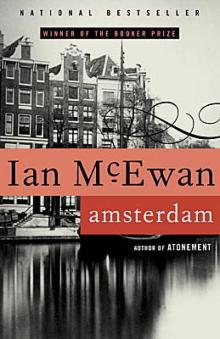 Amsterdam
Amsterdam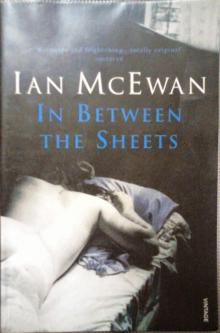 In Between the Sheets
In Between the Sheets Atonement
Atonement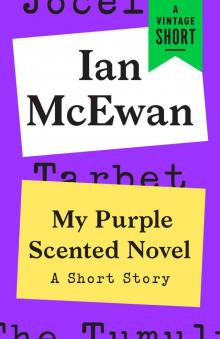 My Purple Scented Novel
My Purple Scented Novel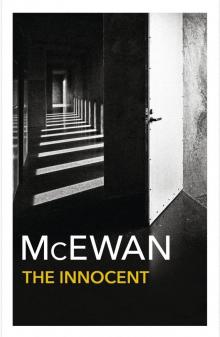 The Innocent
The Innocent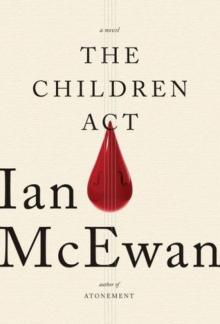 The Children Act
The Children Act Enduring Love
Enduring Love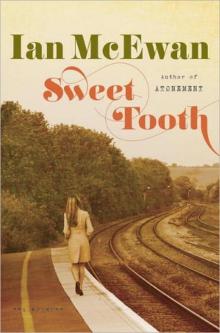 Sweet Tooth
Sweet Tooth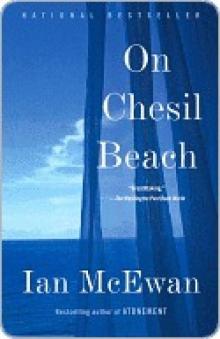 On Chesil Beach
On Chesil Beach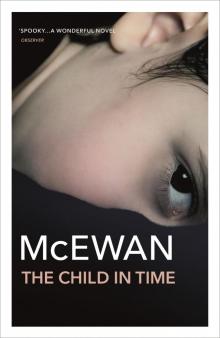 The Child in Time
The Child in Time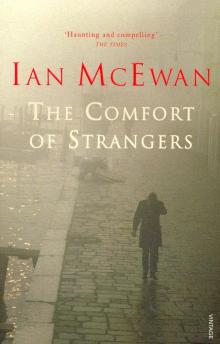 The Comfort of Strangers
The Comfort of Strangers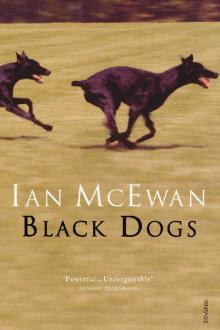 Black Dogs
Black Dogs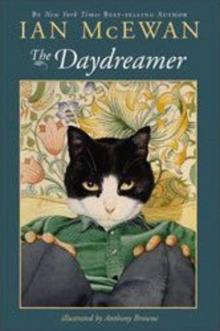 The Daydreamer
The Daydreamer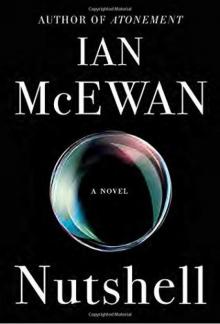 Nutshell
Nutshell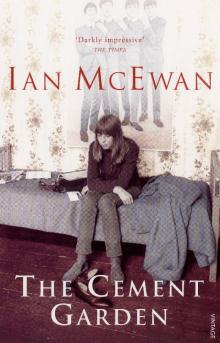 The Cement Garden
The Cement Garden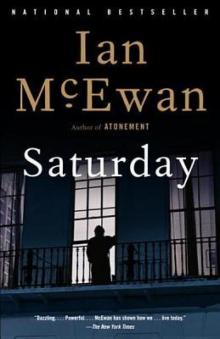 Saturday
Saturday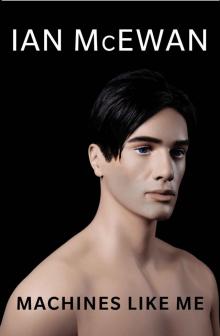 Machines Like Me
Machines Like Me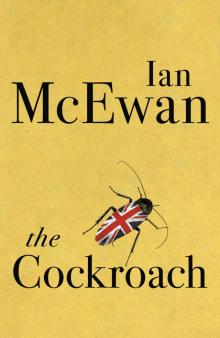 The Cockroach
The Cockroach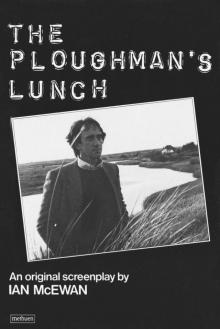 The Ploughman’s Lunch
The Ploughman’s Lunch